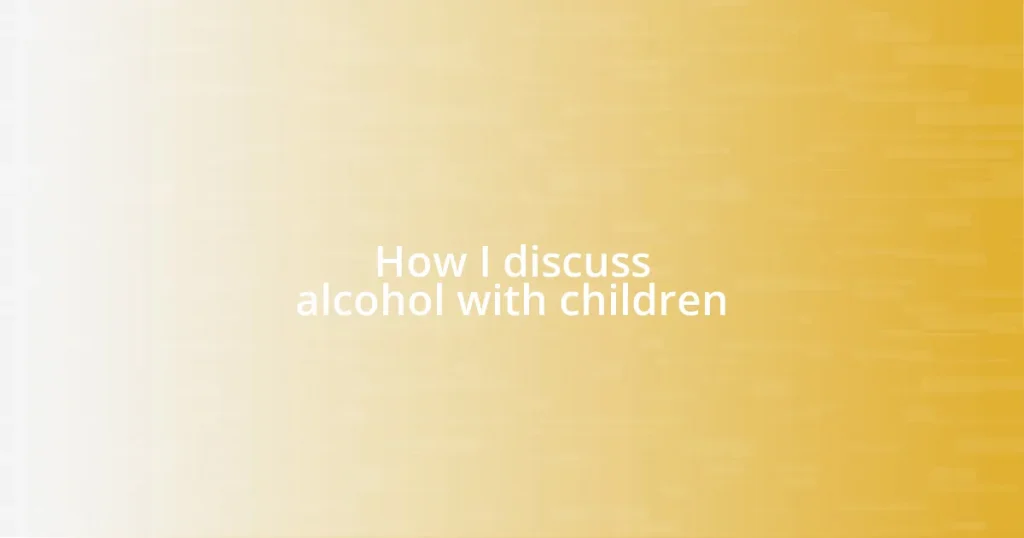Key takeaways:
- Alcohol adversely affects developing brains, impacting decision-making and family relationships, with long-term risks for dependency and mental health issues.
- Use age-appropriate language to discuss alcohol with children; adapt conversations as they grow, focusing on peer pressure and personal values.
- Teach healthy coping mechanisms like journaling, exercise, and mindfulness to provide children with alternatives to alcohol when facing challenges.
- Encourage ongoing discussions about alcohol in a safe and relatable manner, integrating personal experiences to foster openness and critical thinking.
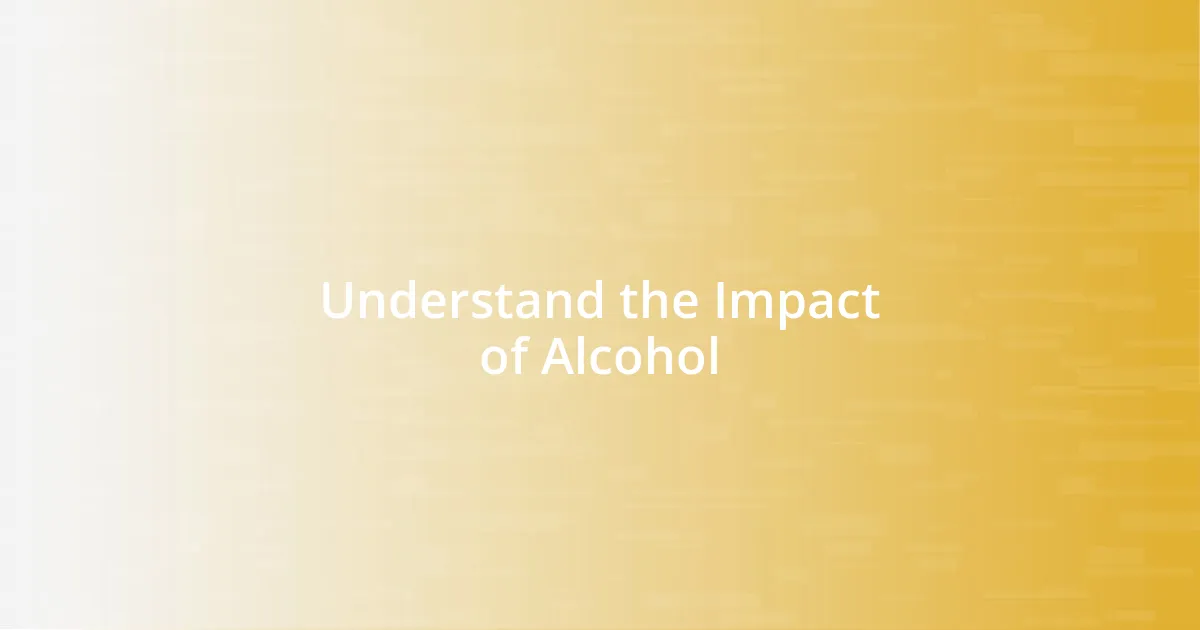
Understand the Impact of Alcohol
Alcohol can have a profound effect on developing brains, altering their ability to think clearly and make sound decisions. I often think back to my own teenage years; I had friends who dabbled with drinking early on, and it seemed to cloud their judgment. Have you ever noticed how peer influence can sometimes overshadow our better senses, especially during those critical years of growth?
Besides affecting decision-making, alcohol can also strain relationships within families. When I was growing up, the atmosphere would change dramatically during family gatherings where alcohol was involved. It was disheartening to see family members argue or become distant after a few drinks. How many of us have experienced that tension? It really made me realize the ripple effects of alcohol use beyond just the individual.
Moreover, the long-term impact of early alcohol exposure can set the stage for future struggles with dependency or mental health issues. I’ve seen firsthand how a person’s challenges with alcohol can echo through their life, creating a cycle that’s difficult to break. Understanding these consequences isn’t just important; it’s vital for guiding the next generation towards healthier choices. What steps can we take now to break this cycle?
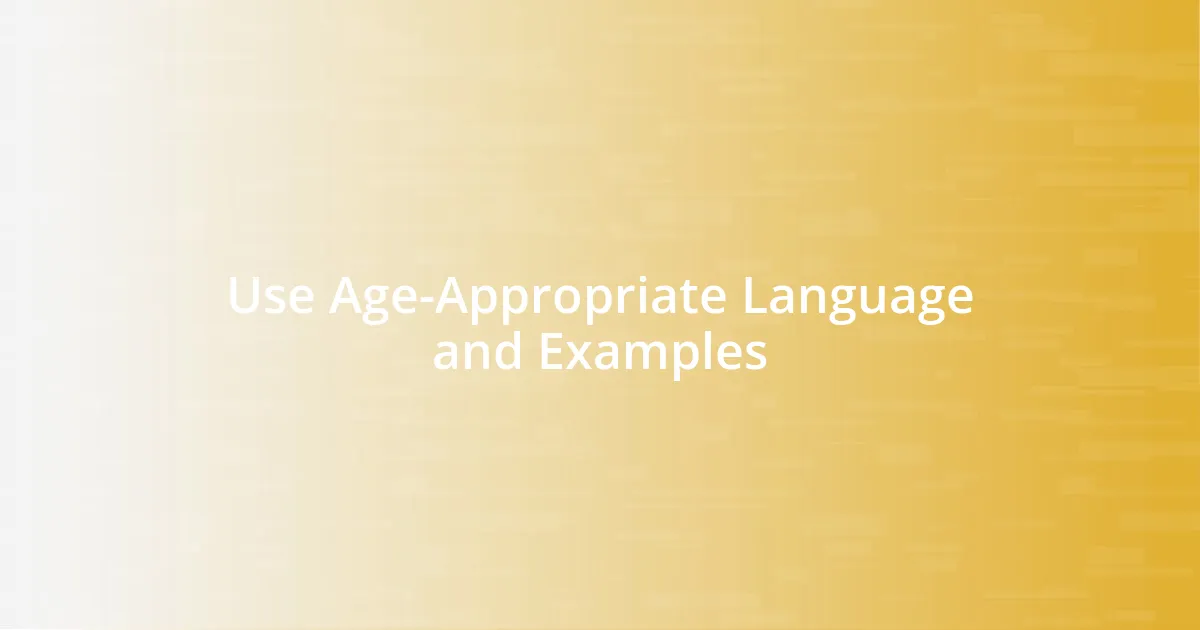
Use Age-Appropriate Language and Examples
Using age-appropriate language is crucial when discussing alcohol with children. The words we choose can significantly shape their understanding of the topic. For younger kids, I often find it helpful to describe alcohol simply as a “drink that some grown-ups use to relax, but it’s important to know it can be harmful.” It’s fascinating to see their eyes light up or furrow in confusion, making me realize how vital clarity is at this stage.
As kids grow older, the discussion needs to evolve. For teens, I delve into more complex aspects, like peer pressure. I remember a time when my own child faced a situation where friends encouraged drinking at a party. I told them how important it is to know one’s limits and make choices aligned with their values. This made the idea of alcohol less mysterious—a topic open for dialogue rather than taboo.
Comparison can also be an effective teaching tool. I remember explaining how alcohol affects the body differently than other substances. I’d say, “Think of alcohol like fuel for a car; too much can cause the engine to malfunction.” It’s a relatable analogy that resonated well, helping them visualize the concept rather than merely hearing facts. I encourage parents to personalize this learning through conversations and experiences relevant to their children’s lives.
| Age Group | Age-Appropriate Language Example |
|---|---|
| Young Children | “Alcohol is a drink that some grown-ups use to relax, but it can be harmful.” |
| Teenagers | “You have the power to say no; it’s okay to stick to your beliefs even when friends pressure you.” |
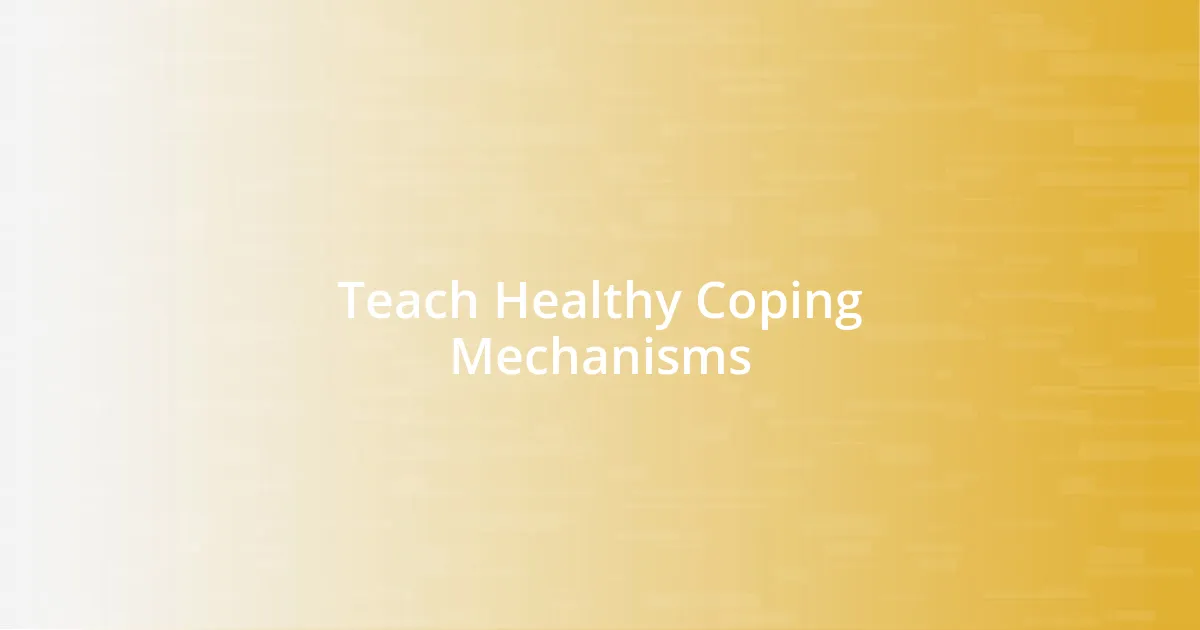
Teach Healthy Coping Mechanisms
Teaching children healthy coping mechanisms is crucial for their emotional development. I’ve often reflected on how I navigated my own feelings in tough situations. Instead of turning to substances like alcohol, I discovered healthier outlets such as creative writing and sports. Sharing these experiences can empower kids to recognize they have choices; they don’t have to resort to unhealthy habits when life gets difficult.
Here are some effective coping mechanisms you can teach:
- Journaling: Encourage kids to express their thoughts and feelings on paper. It can be a great way to process emotions without outside influences.
- Physical Activity: Regular exercise is a powerful stress reliever. Whether it’s dancing, biking, or just going for a walk, moving your body can boost mood significantly.
- Mindfulness and Breathing: Simple breathing exercises can help calm anxious minds. I often practice this with my kids, turning moments of stress into opportunities for relaxation.
- Creative Outlets: Art, music, or any form of creativity can be transformative. I remember painting during tough times as a kid; it let me express what I couldn’t put into words.
- Seeking Support: Encourage them to talk to trusted adults or friends when things feel overwhelming. I always appreciate a listening ear when I’m facing challenges, and it’s important that kids feel they can reach out too.
By equipping children with these skills, you help them build resilience. I’ve seen how owning their feelings can empower them in situations where peer pressure might otherwise cloud their judgment. It’s a gift to instill these lessons early on, shaping their future responses to life’s many challenges.
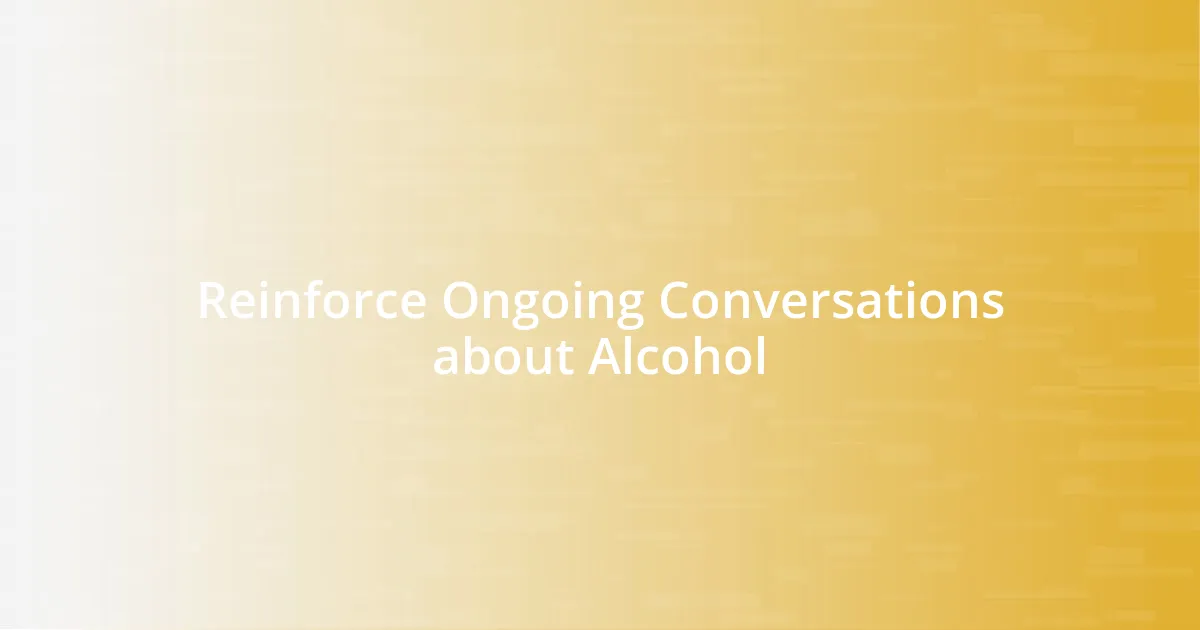
Reinforce Ongoing Conversations about Alcohol
Reinforcing ongoing conversations about alcohol is vital for gradual understanding. I remember one time during dinner, my child curiously asked why some adults drink. Instead of brushing it off, I turned it into a discussion, sharing my thoughts on moderation and responsibility. It was interesting to witness how that simple dinner conversation opened a door for more questions, encouraging them to think critically rather than take things at face value.
In my experience, consistent dialogue creates a safe space for kids to discuss alcohol freely. I’ve found that when I approach the topic regularly—not just during “the talk”—it helps normalize these conversations. For instance, I’ve casually woven in discussions about alcohol while watching a movie that features drinking. This approach made it less daunting for my child to ask questions and express their concerns about peer pressure. I think creating an ongoing dialogue relieves some of that pressure around the subject and fosters an understanding that it’s okay to talk about tough topics.
Another technique that has worked well for me is integrating real-life experiences into our conversations. I often share stories from my youth, reflecting on a time I felt social pressure to drink. By expressing my own vulnerabilities, I found that my child could relate and felt more comfortable opening up about their own thoughts and experiences. I firmly believe that having these discussions repeatedly reinforces the basic messaging surrounding alcohol and instills the importance of making informed choices.










